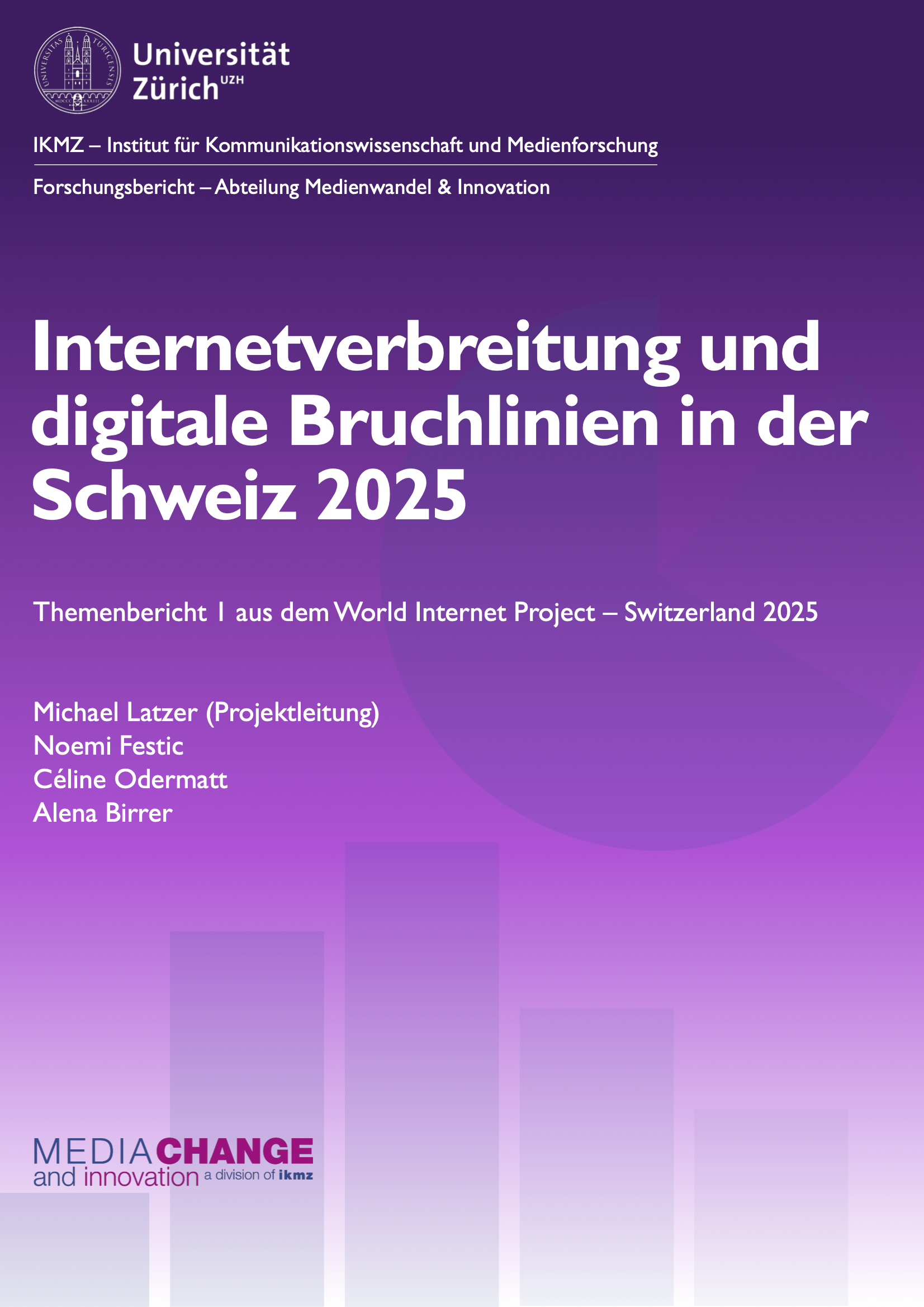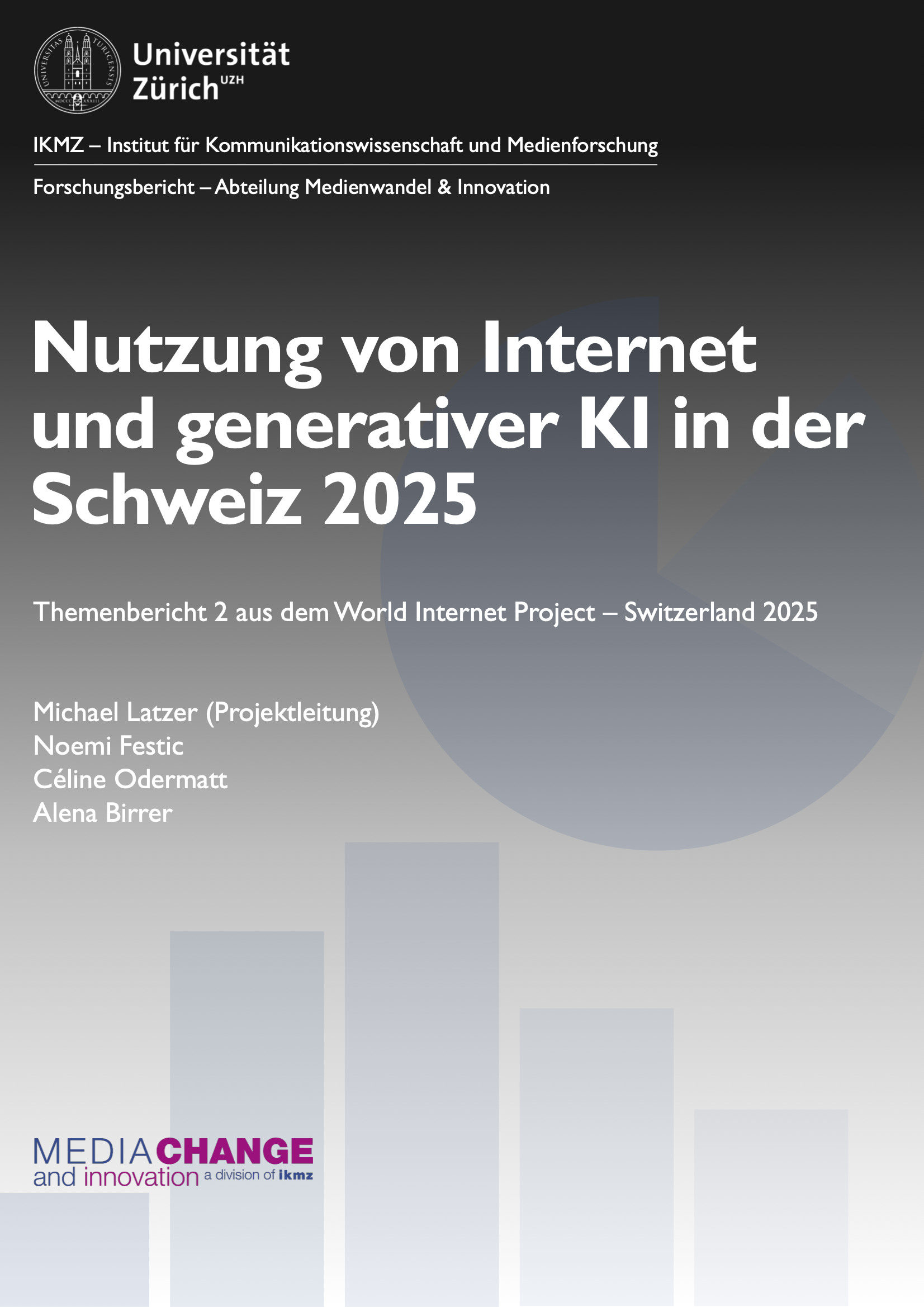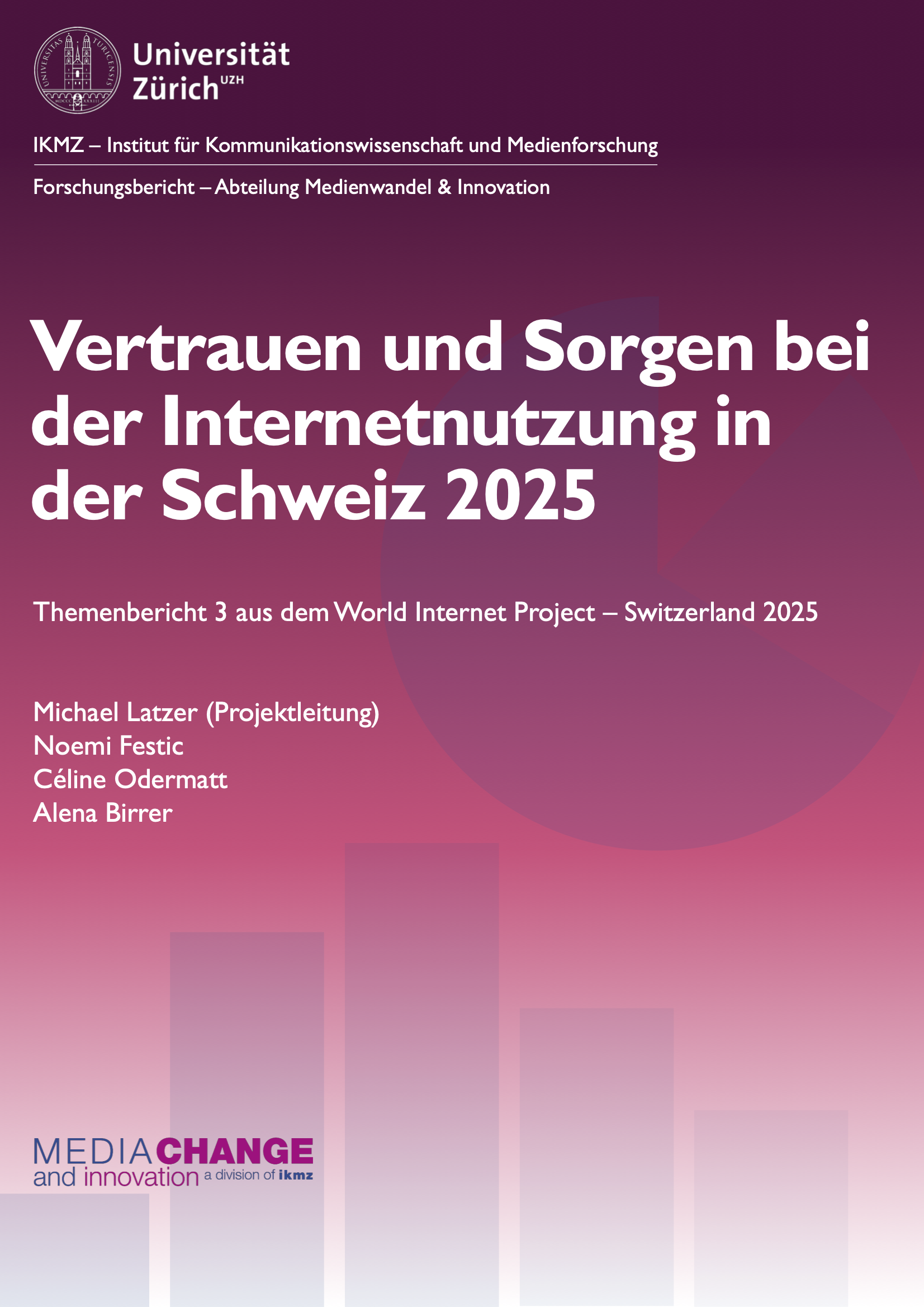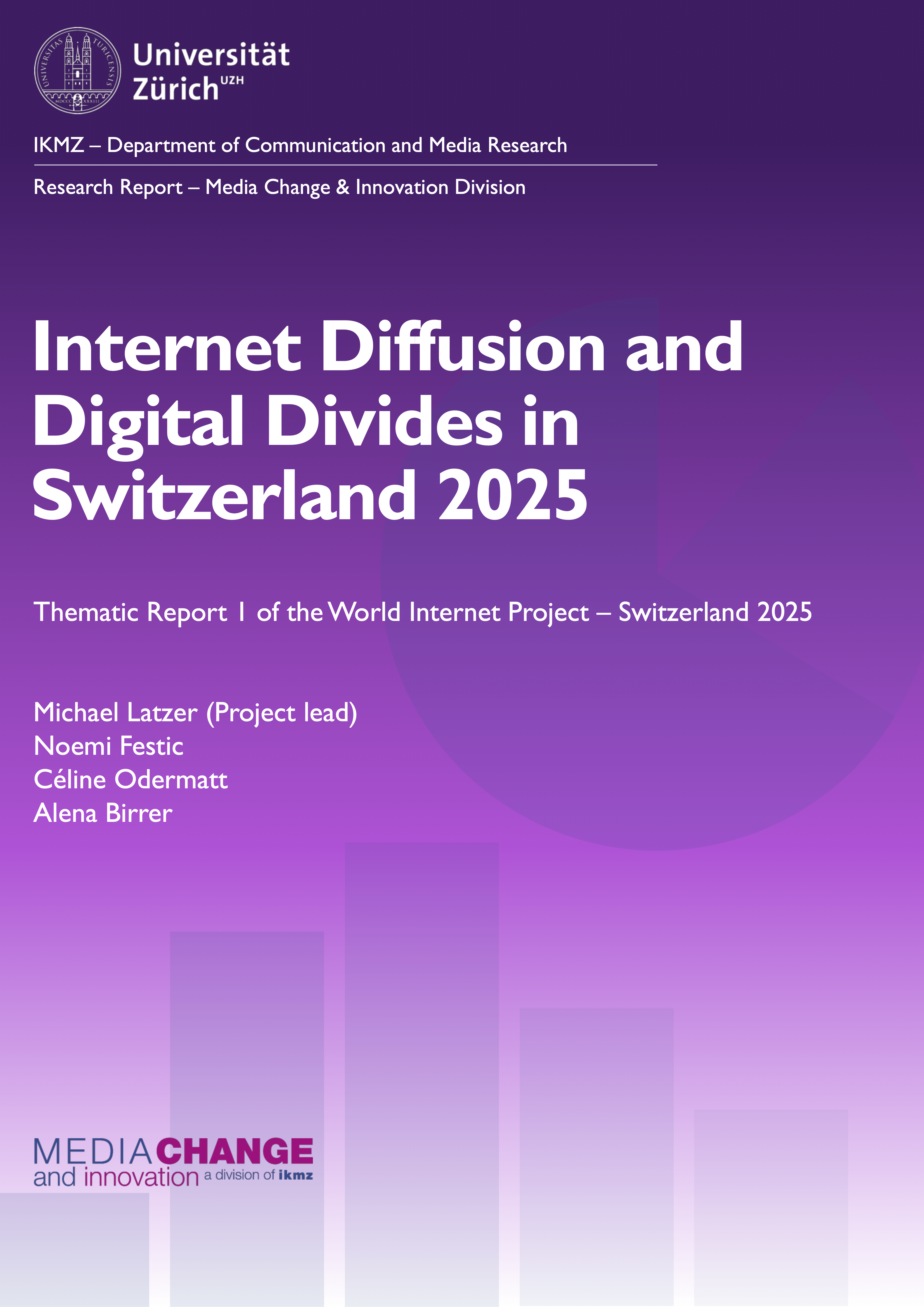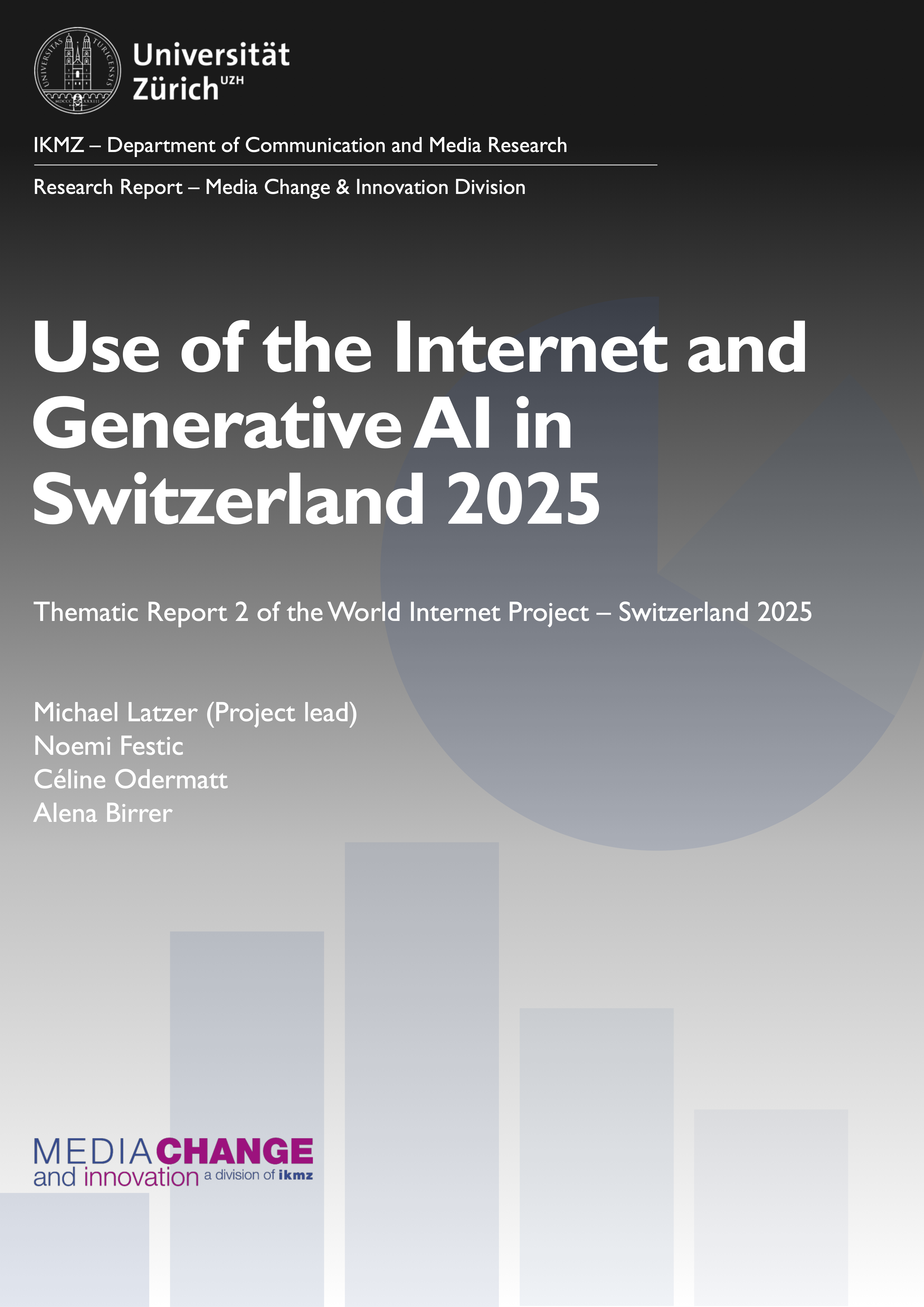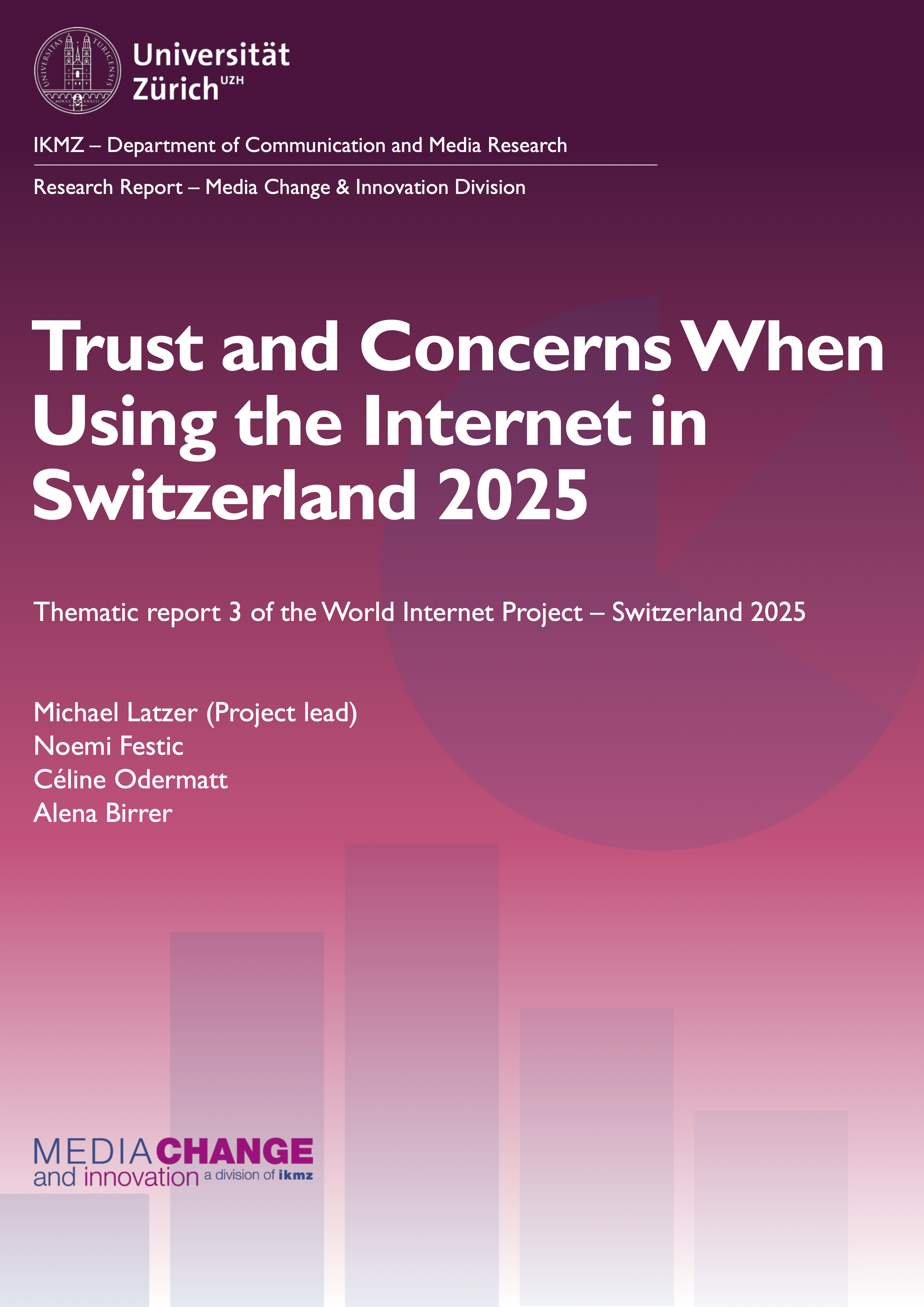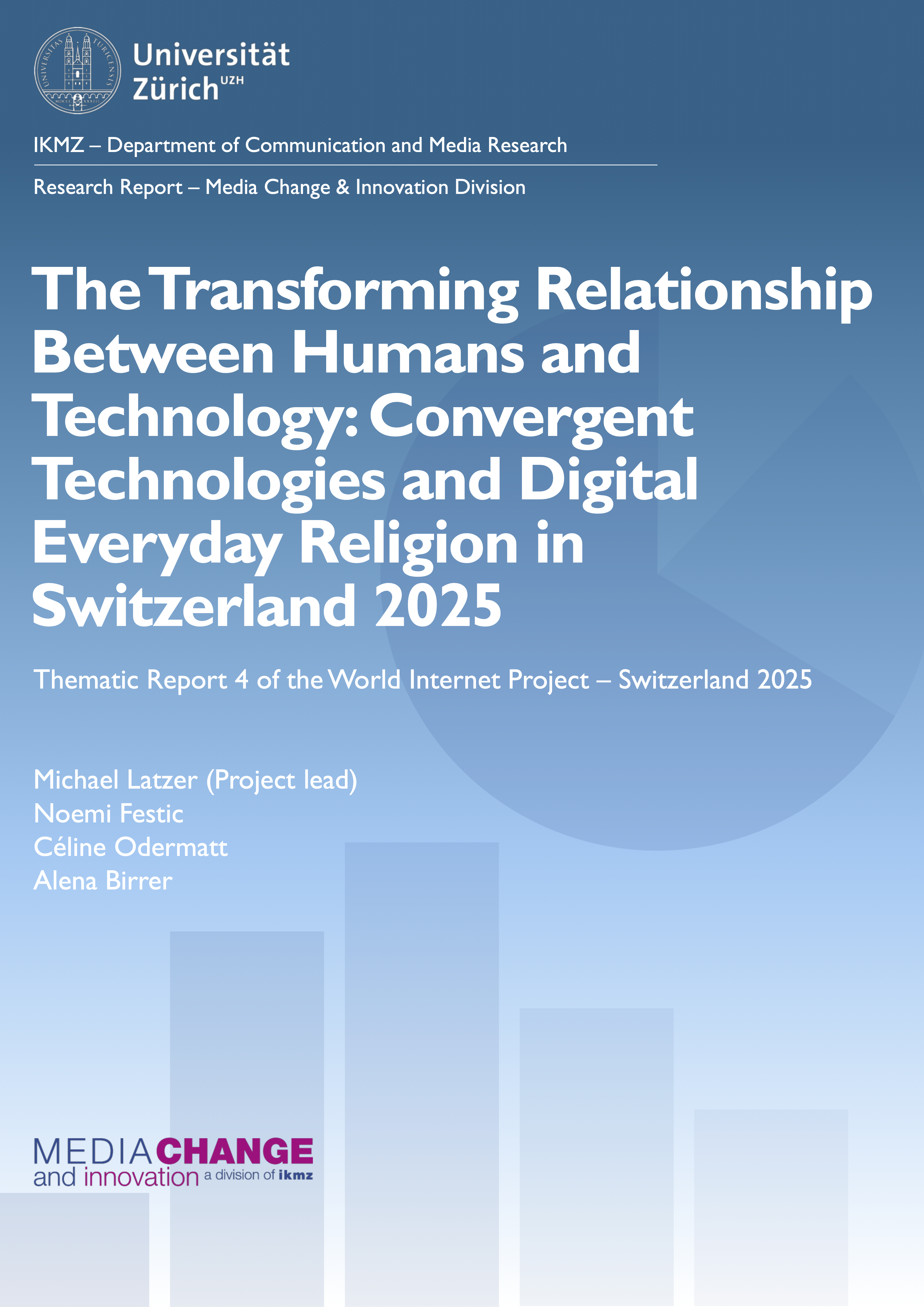World Internet Project – Switzerland 2025 (WIP-CH 2025)
Findings of WIP-CH 2025
For the findings of the WIP-CH 2025 we refer to the four research reports (Themenberichte) as well as to the WIP-CH 2025 News Release (English, German, French, Italian) and Executive Summary (English and German).
News Release
- News Release WIP-CH 2025 (in English)
- News Release WIP-CH 2025 (in German)
- News Release WIP-CH 2025 (in French)
- News Release WIP-CH 2025 (in Italian)
Executive Summary
Research Reports 2025 in German (Themenberichte)
- Internetverbreitung und digitale Bruchlinien in der Schweiz 2025
- Nutzung von Internet und generativer KI in der Schweiz 2025
- Vertrauen und Sorgen bei der Internetnutzung in der Schweiz 2025
- Mensch-Technik-Beziehung im Wandel: Konvergierende Technologien und digitale Alltagsreligion in der Schweiz 2025
Research Reports 2025 in English
- Internet Diffusion and Digital Divides in Switzerland 2025
- Use of the Internet and Generative AI in Switzerland 2025
- Trust and Concerns When Using the Internet in Switzerland 2025
- The Transforming Relationship Between Humans and Technology: Convergent Technologies and Digital Everyday Religion in Switzerland 2025
Infographics
- The digitalization of everyday life is overburdening young people (English / German)
- Generative AI is taking over everyday life in Switzerland: from experimentation to regular use (English / German)
- Increasing use of digital services in everyday life in Switzerland (English / German)
- Digitalization level before, during and after the Covid pandemic (English / German)
- Digitalization push raises concerns in Switzerland (English / German)
- The young and the old differ regarding generative AI (English / German)
- Regular AI users think differently (English / German)
- Skepticism in Switzerland toward the new generation of technology (English / German)
- Increasing self-censorship in Switzerland due to perceived online surveillance (English / German)
- Internet use is becoming an everyday religion especially among young people in Switzerland (English / German)
Selected Graphs
- Knowledge and Use of Generative AI Over Time, 2022–2025 (English / German)
- Knowledge and Regular Use of Generative AI by Age, 2025 (English / German)
- Use Purposes of Generative AI, 2025 (English / German)
- Assessment of Risks and Opportunities of Generative AI, 2025 (English / German)
- Assessment of Selected Risks und Opportunities of Generative AI by Age, 2025 (English / German)
- Assessment of Risks and Opportunities of Generative AI by Use, 2025 (English / German)
- Belief in the Emergence of General Artificial Intelligence, 2025 (English / German)
- Average Daily Internet Use Time over Time 2011–2025 (English / German)
- Desire to Reduce Internet Use Time by Age, 2025 (English / German)
- Sense of Belonging to the Information Society by Internet Skills Over Time 2015–2025 (English / German)
- Perceived Benefits of the Internet and Converging Technologies Over Time 2023–2025 (English / German)
- Indicators of Transhumanist Belief, 2025 (English / German)
Icons made by Freepik, Ehtisham Abid, monkik and juicy_fish from www.flaticon.com
About the Project
Th e Media Change & Innovation Division is the Swiss country partner of the World Internet Project (WIP). This international, collaborative project is looking at the social, political and economic impact of the Internet and other new technologies. The project started in 1999 and is chaired by Prof. Jeff Cole from the Annenberg School Center for the Digital Future, University of Southern California (USC), Los Angeles. The consortium includes more than 25 partners in countries and regions all over the world. The WIP conducts detailed, international comparative longitudinal studies on the use and impact of the Internet, publishes national and international reports and holds annual conferences. Results of the WIP-CH 2025 are based on an online survey with a representative sample of Swiss internet users aged 14 and over.
e Media Change & Innovation Division is the Swiss country partner of the World Internet Project (WIP). This international, collaborative project is looking at the social, political and economic impact of the Internet and other new technologies. The project started in 1999 and is chaired by Prof. Jeff Cole from the Annenberg School Center for the Digital Future, University of Southern California (USC), Los Angeles. The consortium includes more than 25 partners in countries and regions all over the world. The WIP conducts detailed, international comparative longitudinal studies on the use and impact of the Internet, publishes national and international reports and holds annual conferences. Results of the WIP-CH 2025 are based on an online survey with a representative sample of Swiss internet users aged 14 and over.
Further Publications
- Latzer, Michael (2025): Digitalization, AI and the rise of techno-religion: Transhumanist promises and the challenge to Enlightenment. Telecommunications Policy. https://doi.org/10.1016/j.telpol.2025.103115 [pdf]
- Frascaria, Giulia / Jaramillo-Dent, Daniela / Latzer, Michael (2025): Adoption of Human Augmentation Technologies for Non-Medical Applications: A Systematic Review of Empirical Literature. Working Paper – Media Change & Innovation Division. University of Zurich, Zurich. [more] [pdf]
- Kappeler, Kiran (2024): A Longitudinal Perspective on Digital Skills for Everyday Life: Measurement and Empirical Evidence. Media and Communication, 12. https://doi.org/10.17645/mac.8159 [pdf]
- Latzer, Michael (2022): The Digital Trinity—Controllable Human Evolution—Implicit Everyday Religion. Characteristics of the Socio-Technical Transformation of Digitalization. Kölner Zeitschrift für Soziologie und Sozialpsychologie. https://doi.org/10.1007/s11577-022-00841-8 [more] [pdf]
- Büchi, Moritz / Festic, Noemi / Just, Natascha / Latzer, Michael (2021): Digital inequalities in online privacy protection: effects of age, education, and gender. In: Hargittai E (ed.) Handbook of Digital Inequality. Edward Elgar Publishing, pp. 293–307. [more]
- Festic, Noemi / Büchi, Moritz / Latzer, Michael (2021): It’s Still a Thing: Digital Inequalities and their Evolution in the Information Society. Studies in Communication and Media, 10(3), 326–361. https://doi.org/10.5771/2192-4007-2021-3-326 [more] [pdf]
- Kappeler, Kiran / Festic, Noemi / Latzer, Michael (2020): Who Remains Offline and Why? Growing Social Stratification of Internet Use in the Highly Digitized Swiss Society. Working Paper. University of Zurich, Zurich. [pdf]
- Büchi, Moritz / Festic, Noemi / Latzer, Michael (2019): Digital overuse and subjective well-being in a digitized society. Social Media + Society, 5(4), 1–12 [more] [pdf]
- Büchi, Moritz / Festic, Noemi / Latzer, Michael (2018): How Social Well-Being Is Affected by Digital Inequalities. In: International Journal of Communication, 12, 3686–3706. [more] [pdf]
- Latzer, Michael / Festic, Noemi / Büchi, Moritz (2018): Informationsgesellschaft Schweiz: Internetnutzung und digitales Wohlbefinden. In: DemoSCOPE-News 2018-01, 6-7. [more] [pdf]
- Bauer, Johannes M. / Latzer, Michael (2016): The economics of the Internet: an overview. In: Bauer, J. and Latzer, M. (Eds), Handbook on the Economics of the Internet. Cheltenham, Northampton: Edward Elgar, 3-20. [more] [pdf]
- Büchi, Moritz / Just, Natascha / Latzer, Michael (2016): Modeling the second-level digital divide: A five-country study of social differences in Internet use. In: New Media & Society, 18 (11), 2703-2722, doi: 10.1177/1461444815604154. [more] [pdf]
- Büchi, Moritz / Just, Natascha / Latzer, Michael (2017): Caring is not enough: The importance of Internet skills for online privacy protection. In: Information, Communication & Society, 20(8), 1261-1278. doi: 10.1080/1369118X.2016.1229001 [more] [pdf]

